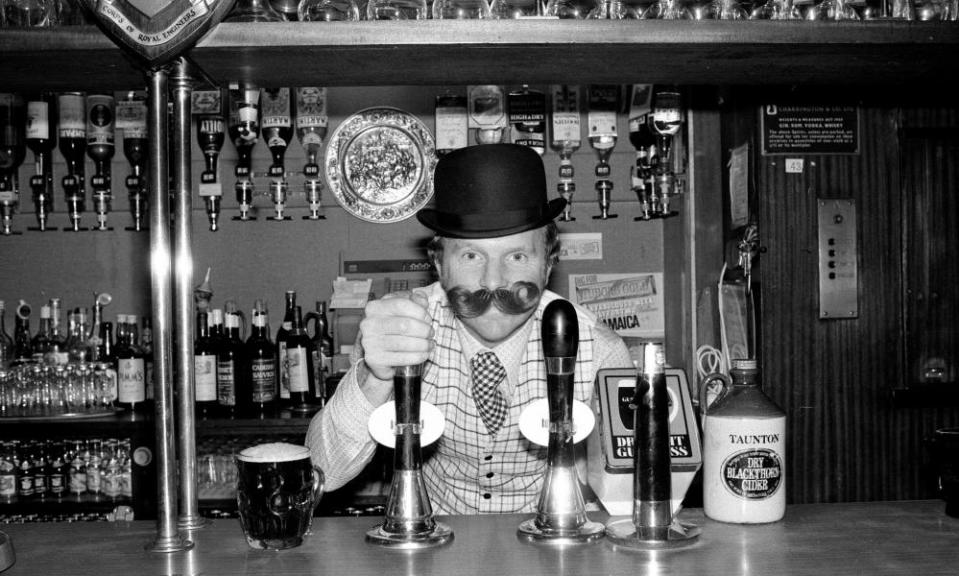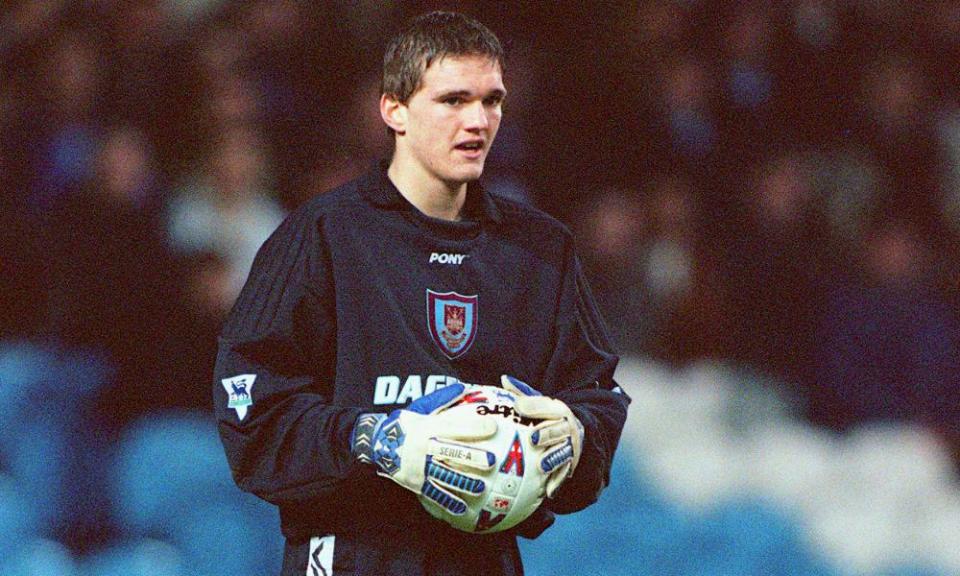Who is the most recent Premier League footballer to own or run a pub?
“It used to be the standard retirement plan for a player to run a pub after leaving the game. Who was the last top-flight player in England known to have done this?” wonders Ian Robson.
Well, given the modern-day footballer can’t really go near a pub without causing a “Twitter storm” and generally make a packet of cash, choosing a post-football career ordering in ale and crisps is not as tempting as it used to be. Isn’t that right, Bobby?

That’s not to say there aren’t some recent examples. There’s Phil King, who played in the Premier League with Sheffield Wednesday and who has run the Dolphin pub in Swindon since the early 2000s. He’s a pillar of the community who helps replace stolen bikes among other things. Meanwhile, Michael Haughey notes: “Nicky Reid, formerly of Manchester City and Blackburn, who retired from playing in 1992, now runs the Masons Arms in Chorley and has revitalised the pub since he took over in 2017.”
Oh, and talking of the Masons Arms – the 31st most popular pub name in the UK – there’s another ex-footballer opening one. Former Newcastle full-back Olivier Bernard is refurbishing the Masons Arms in Blyth, Northumberland. “For me, I’ve always wanted to open a pub, but not only a pub: I wanted a more family feel, it’s going to be more a gastro-restaurant/pub, not somewhere you just go to sit and have a drink,” he told chroniclelive.co.uk. “I’m very keen on my food, so everything is going to be very tasty. It’s all about making people feel welcome.” If Tripadvisor is anything to go by, the reopening has gone well.
But here’s Jim Hughes with what has to be a winner: “Never mind ex-players; former Stoke academy graduate and current Championship-level Boro defender Ryan Shotton owns The Black Lion Pub in Cheddleton, Staffordshire.
“Shotts might have struggled to live up to being the heir to Rory Delap’s long throw-in responsibilities during our Premier League years, but he’ll forever be cherished in The Potteries for kicking the ball out of Ben Foster’s hands for a last-minute winner away at The Hawthorns and somehow getting away with it!”
The shortest Premier League playing career
“Which footballer has played the fewest number of minutes or seconds in the Premier League?” asks Bogdan Kotarlic.
“Shout out to Steve Melton who played in Nottingham Forest’s last ever Premier League match on 16 May 1999 v Leicester. And we won 1-0! That was his only top-flight action,” recalls Adam Wilson. Other one-game wonders in the Premier League include Neil Finn (West Ham), Andrew Barrowman (Birmingham) and Rhys Weston (Arsenal).
But Chris Izod goes way beyond a single match and digs out a player we have covered before for an example that lasted a mere second. “In 1999 in a match between Arsenal and Manchester United, Nick Culkin came on as a late substitute after an injury to United’s goalkeeper Raimond van der Gouw following a goalmouth scramble,” writes Chris. “It was already deep into stoppage time at this point. All that was left to do was for Culkin to take the free-kick with the referee blowing for full time approximately one second later. In terms of time on the pitch when the ball was in play this record for shortest debut in the PL won’t ever be realistically broken. There’s a nice clip of this here.” Culkin went on to play for QPR, Radcliffe Borough, Prescot Cables and FC United of Manchester as well as working in garden maintenance.

But not content with that, Chris wants to shave further 10ths off his PB. He adds: “Hypothetically, last weekend in the Brighton v Manchester United match there was an opportunity for this to be broken, in the short term at least. If any Brighton player from Steele, Veltman or Molumby had been a debut substitute when the VAR penalty was awarded, then their total time on the pitch with the ball in play would have been slightly under one second with the ball entering play once the penalty kick was taken and then leaving play once it crossed the goal line for Bruno Fernandes’ full-time winner. Probably not a record any of them would want to have.”
Another shootout outscored by the match preceding it
Following on from last week’s original request, we have another example of a matches with more goals than the penalty kicks that followed.
Here’s Stuart Webber: “The 6-6 Dagenham v Brentford first round League Cup tie in August 2014 deserves a mention. Brentford (newly promoted to the Championship) cruised into a two-goal lead within 10 minutes but Dagenham recovered to bring the scoreline to 4-4 with a late equaliser just before the end of normal time.
“Extra-time saw Dagenham turning a 4-5 deficit into a 6-5 lead with five minutes to go, but ex-Dagger Harley Dean headed a late equaliser for the Bees. Brentford then won the penalty shootout 4-2, helped by a successful penalty from club legend Kevin O’Connor and a save from Richard Lee – both of whom were playing their last match in professional football. The weather gods appeared to appreciate the events at Victoria Road; we were treated to a downpour of biblical proportions in the first half, and, once the skies cleared, a supermoon behind the home end in extra-time! Most first round League Cup ties are eminently forgettable ... but not this one!”
Knowledge archive
A few weeks ago we suggested that Lloyd Owusu was in line to become the first player to play for three relegated teams in the same season (we wrote in April 2009). But in a dusty corner of the Knowledge inbox we overlooked this missive from Justin Horton:
“Malcolm Shotton managed it in 1987-88. He played one game for Oxford United (coming on a sub against Wimbledon on 22 August 1987) and was then transferred to Portsmouth, who like Oxford were relegated from the top flight at the end of that season. Shotton played 10 league games for Pompey but before the end of the season was transferred to Huddersfield in time to play a number of times for the side that came bottom of the old Second Division and were therefore relegated.” And after Yeovil’s recent revival, Shotton’s record is safe for another season.
Can you help?
“Have three teams relegated from the same division in England ever all been promoted straight back up again? I suspect not, but what is the closest it’s ever come to happening?” asks Paul Landsberg.
Inspired by 'more goals in game than shootout' question what has been highest number of red cards more than goals in a match? - Chesham vs Hartley Wintney last night had 3 reds but 0 goals.
— Jack Tanner (@mrjacktanner) September 30, 2020
“We’re not even four full rounds into the new Premier League season and only two sides are currently undefeated. When was the earliest point in a top-flight season where every team has lost at least one match,” wonders Simon Bradley.
“As someone who hates seeing players with 59, 88, 27 etc on their backs, when was the last time a team played with the shirt numbers of 1-11?” asks Stuart from Corby.
“Pep Guardiola was drawn against three Portuguese managers in Champions
League Group C. Are there previous examples of three, or even four
managers from the same country facing each other in a Champions League
group,” asks Rui Pereira.
Send your questions and answers to knowledge@theguardian.com or tweet @TheKnowledge_GU.

 Yahoo Sport
Yahoo Sport 





































